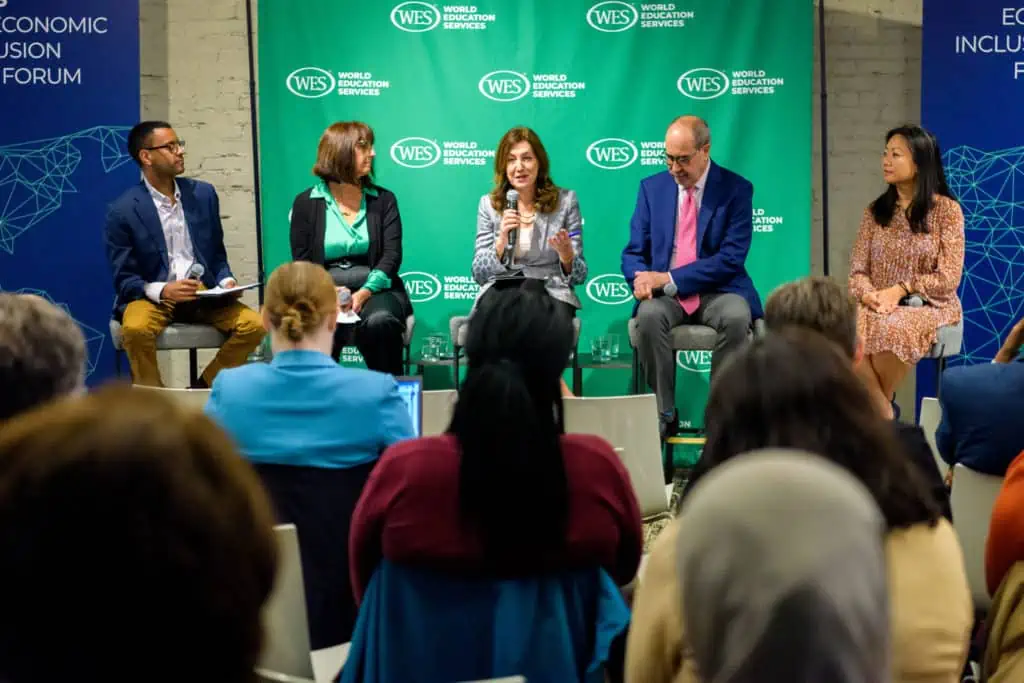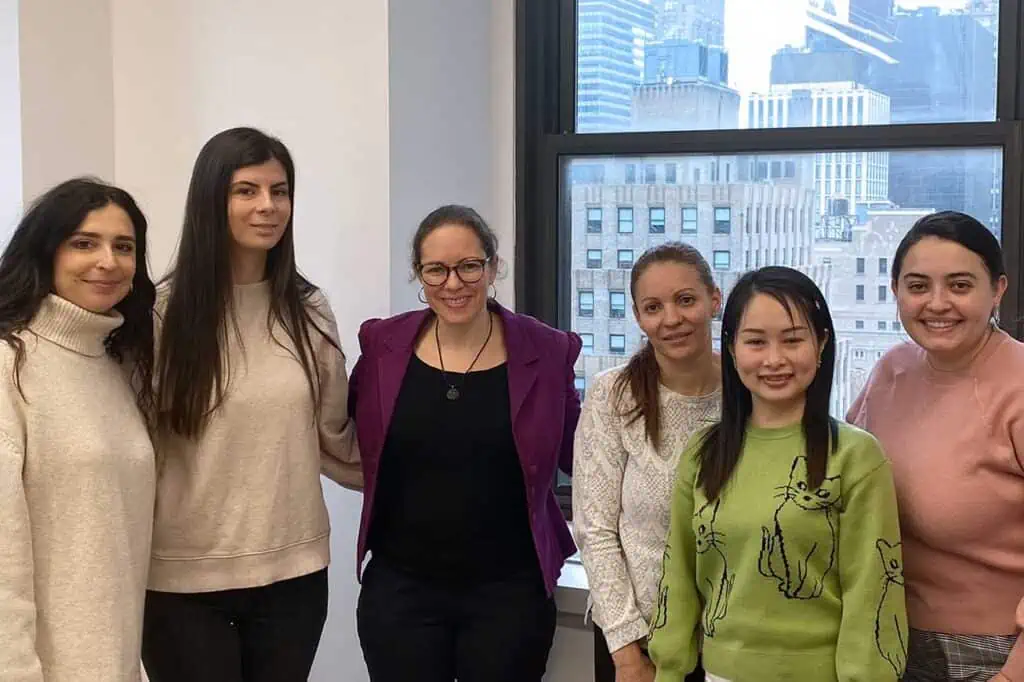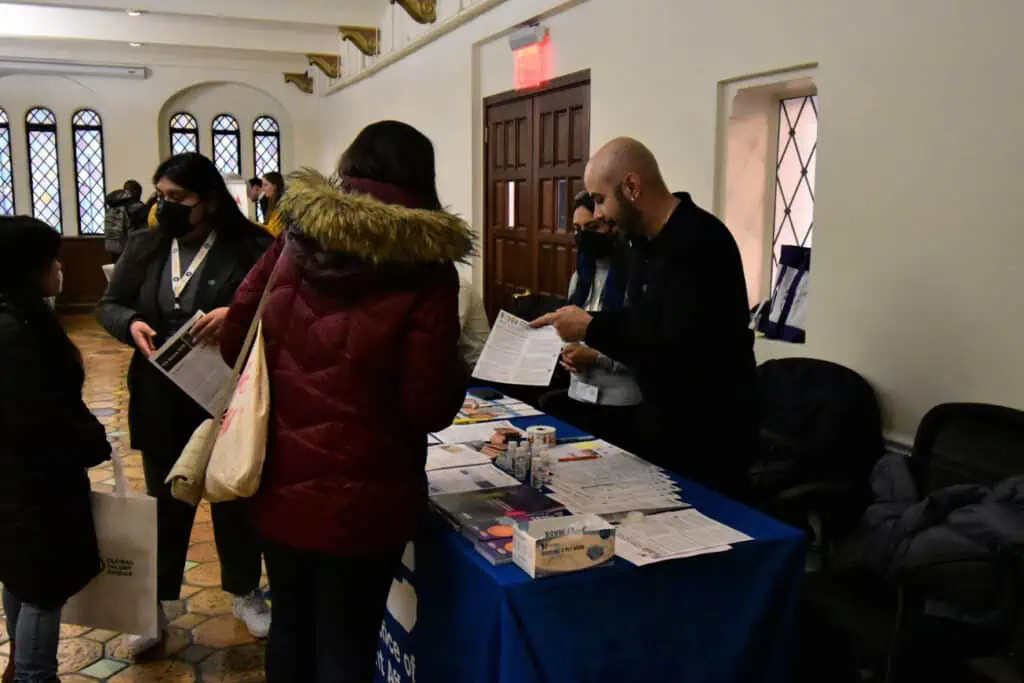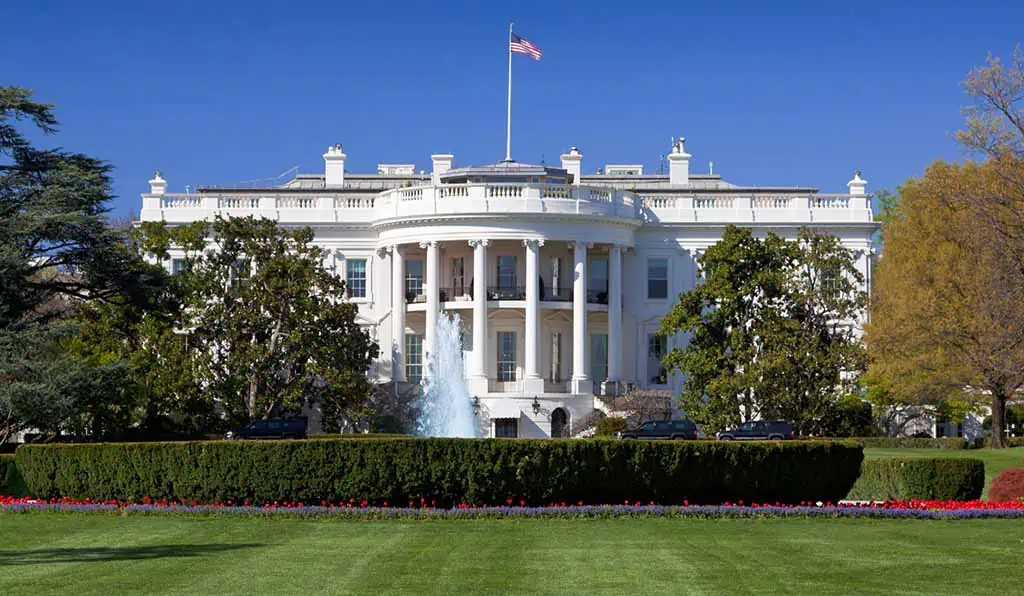The WES Economic Inclusion Forum: Building a Future for Immigrants and Refugees in the U.S.
“Investing in immigrant and refugee inclusion is investing in the future of America.” —Eva Millona, Assistant Secretary for Partnership and Engagement at the U.S. Department of Homeland Security

Eva Millona, a panelist at the World Education Services (WES) Economic Inclusion Forum, captured the prevailing sentiment at this gathering of nationwide partners, immigrant and refugee advocates, policymakers, and organizations in Washington, D.C., in late October. The forum’s discussions and breakout sessions centered on the power of collaborative partnerships as well as the successes, opportunities, and challenges involved in making progress toward immigrant and refugee inclusion in the U.S. workforce.
Esther Benjamin, CEO and Executive Director of WES, and Monica Munn, Managing Director for Social Impact at WES, also emphasized the overarching theme of partnership. As Esther noted: “We recognize that scalable change only happens when many partners work together.”

Monica echoed this statement, asking: “How can we expand our impact and reach together?” She reminded attendees of their collective power to influence systems and change policies to accelerate immigrant and refugee economic inclusion. She identified five themes that anchored the day’s sessions:
- Championing people-centered immigrant leadership initiatives to ensure holistic support and long-term success.
- Considerations of supply and demand to obtain the resources necessary to bolster capacity.
- Gaining access to more flexible funding.
- The importance of nuance in describing immigrant and refugee experiences. “There is no one immigrant or refugee journey. We need to be nuanced in how we design and do our work and in how we partner.”
- The capacity to effectively bridge from policy recommendations to implementation.

The opening plenary, “Federal and State Policies Fostering the Economic Inclusion of Immigrants and Refugees,” featured a panel of practitioners and government officials who described in detail innovative programs, policies, and partnerships that champion economic inclusion.
Following the session, attendees had the option of going into one of three breakout rooms. Below is a summary of the key points discussed in each breakout session:
Engaging Employers in Workforce Inclusion Efforts
This session, moderated by WES’ Daniel Cervan-Gil, featured a panel with the following employers and practitioners: Emmanuel Owusu of the African Bridge Network, Rochelle Cooks of The Welcoming Center, Kimberly Cohen of Upwardly Global, and Anson Green of Tyson Foods. The panelists observed that employers do not consistently recognize the expertise (and often multilingualism) of immigrants and refugees within their workforce. Yet many employers care about DEI goals and retention. Providing clear, transparent career pathways for all workers can help employers capitalize on immigrant and U.S.-born talent alike.
“The stakes are really high for employers,” said Anson Green, who oversees upskilling for frontline workers at Tyson Foods. “We need to do more to support employers to acclimate and grow workers within their systems.”
He added that employers often do not know how to engage with non–profit education and workforce providers, and that’s why it’s so important for them to have a dedicated person on staff “to work effectively with upskilling partners.” By partnering with immigrant workforce organizations, employers can also make strides toward achieving their DEI goals.
Kimberly Cohen of Upwardly Global discussed the invisible barriers immigrant and refugee workers face from online applicant tracking systems (ATS) and human resources screening processes more broadly. If ATS don’t allow for international experience or credentials, job seekers are automatically screened out.
Reducing the Barriers Faced by Internationally Trained Health Care Workers
This session, moderated by WES’ Fatima Sanz, covered state-level innovative workforce development efforts and policy initiatives that support the inclusion of internationally educated immigrants and refugees in the local health care workforce. The panelists—Illinois State Representative Theresa Mah, Mohamed Khalif of the Washington Academy for International Medical Graduates (WAIMG), Yende Anderson of the Minnesota Department of Health, and Mathew Mengesha of the Spring Institute—agreed that we must push to have existing pathways to licensure expanded, and that pursuing residency, a long and often costly process in the U.S., shouldn’t be the only option for internationally trained physicians. Therefore, advocates should focus on alternative pathways to licensure.
Mohamed Khalif, Executive Director and Co-Founder of WAIMG, noted the importance of advocacy on behalf of this underemployed population, and of also educating employers, policymakers, and the public about the value of health care education obtained abroad. He observed: “We need to advocate for communities to not be underpaid because that devalues the license.”
Yende Anderson, IMG Assistance Program Coordinator at the Minnesota Department of Health, emphasized the importance of providing culturally competent health care in the U.S., a gap often filled by internationally trained health care workers (who may also be multilingual). She explained that poor cultural competency in health care translates to higher costs for the patients affected and can result in increased medical errors, prolonged lengths of stay, avoidable hospitalizations, and over- and under-utilization of procedures.
The Future of Refugee Economic Inclusion
This session, moderated by WES’ Nomzana Augustin, focused on forging innovative partnerships to support economic opportunities for new arrivals at the local, state, and national levels. Panelists included Ali Aljundi of Refugee Congress, Sarah Krause of the Community Sponsorship Hub, Karen Phillippi of the New Americans Office of Global Michigan, and Tiffany Jaramillo of Emily Griffith Technical College. They discussed how, through partnerships, their organizations and states have been able to quickly respond to emerging needs, leverage referral networks, and ensure more inclusive communities.
Much of the session focused on the private sponsorship of refugees. Private sponsorship has had much success in Canada and is poised to launch as a pilot in the U.S. in the coming months. Panelists talked about the benefits and pitfalls of such an initiative. Sarah Krause, Co-Founder and Executive Director of the Community Sponsorship Hub, noted the importance of bringing immigrants and refugees in “not only to advise but also to design programs.”
Thanks to all who joined us at the WES Economic Inclusion Forum, which convened more than 150 advocacy organizations, coalitions, and programmatic and grant partners to learn together and collaborate on a shared agenda of advancing the economic, social, and workforce inclusion of refugees and immigrants.
If you missed it, read a summary of the highlights and major themes from the SIIP Convening, held in conjunction with the WES Economic Inclusion Forum.





